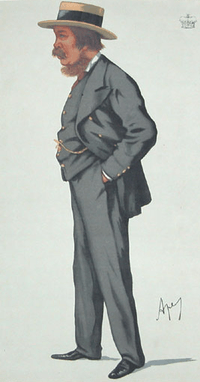William Cecil, 3rd Marquess of Exeter
| The Most Honourable The Marquess of Exeter PC | |
|---|---|
|
The Marquess of Exeter by Carlo Pellegrini, 1881. | |
| Captain of the Gentlemen-at-Arms | |
|
In office 20 March 1867 – 1 December 1868 | |
| Monarch | Victoria |
| Prime Minister |
The Earl of Derby Benjamin Disraeli |
| Preceded by | The Earl of Tankerville |
| Succeeded by | The Lord Foley |
| Personal details | |
| Born | 30 April 1825 |
| Died | 14 July 1895 (aged 70) |
| Nationality | British |
| Political party | Conservative |
| Spouse(s) | Lady Georgina Pakenham (d. 1909) |
William Alleyne Cecil, 3rd Marquess of Exeter PC (30 April 1825 – 14 July 1895), styled Lord Burghley between 1825 and 1867, was a British peer and Conservative politician. He served as Treasurer of the Household between 1866 and 1867 and as Captain of the Honourable Corps of Gentlemen-at-Arms between 1867 and 1868.
Background
Exeter was the eldest son of Brownlow Cecil, 2nd Marquess of Exeter, and Isabella, daughter of William Stephen Poyntz, MP.[1] He was educated at St. John's College, Cambridge, where he was president of the University Pitt Club.[2]
Cricket
Exeter played first-class cricket for the Marylebone Cricket Club and Cambridge University between 1847 and 1851.[3]
Political career
Exeter was elected to the House of Commons for South Lincolnshire in 1847, a seat he held until 1857,[1][4] and then represented North Northamptonshire from 1857 to 1867.[1][5] He served under the Earl of Derby as Treasurer of the Household from 1866 to 1867,[6] when he succeeded his father in the marquessate and entered the House of Lords. In March 1867 Derby appointed him Captain of the Honourable Corps of Gentlemen-at-Arms, a post he held until December 1868,[6] the last nine months under the premiership of Benjamin Disraeli. In 1866 he was admitted to the Privy Council.[7]
Family
Lord Exeter married Lady Georgina Sophia Pakenham, daughter of Thomas Pakenham, 2nd Earl of Longford, on 17 October 1848. They had at least nine children:
- Brownlow Henry George, Lord Burghley, later the 4th Marquess of Exeter (1849–1898)
- Lord Francis Horace Pierrepont (1851–1889), married Edith Brookes, daughter of Sir William Cunliffe Brooks, 1st Baronet.
- Lord William (1854–1943), married (1) Mary Tyssen-Amherst, Baroness Amherst, (2) Violet Freer.
- Lady Catherine Sarah (1861–1918), married Henry de Vere Vane, 9th Baron Barnard.
- Colonel Lord John Pakenham Joicey-Cecil (1867–1942)
- Lady Isabella Georgiana Katherine (d. 1903), married William Battie-Wrightson.
- Lady Mary Louisa Wellesley (d. 1930), married James Hozier, 2nd Baron Newlands.
- Lady Louisa Alexandrina (d. 1950), died unmarried.
- Lady Frances Emily (d. 1951), died unmarried.
Lord Exeter died in July 1895, aged 70, and was succeeded in his titles by his eldest son Brownlow, who also became a government minister. The Marchioness of Exeter died in March 1909.[1]
References
- 1 2 3 4 Lundy, Darryl. "William Alleyne Cecil, 3rd Marquess of Exeter". The Peerage.
- ↑ Fletcher, Walter Morley (2011) [1935]. The University Pitt Club: 1835-1935 (First Paperback ed.). Cambridge: Cambridge University Press. p. 78. ISBN 978-1-107-60006-5.
- ↑ "Player profile: Lord Burghley". CricketArchive. Retrieved 26 August 2011.
- ↑ leighrayment.com House of Commons: Lichfield and Tamworth to London and Westminster South
- ↑ leighrayment.com House of Commons: Northampton North to Nuneaton
- 1 2 Kidd, Charles, Williamson, David (editors). Debrett's Peerage and Baronetage (1990 edition). New York: St Martin's Press, 1990,
- ↑ The London Gazette: no. 23137. p. 3983. 13 July 1866.
External links
- Hansard 1803–2005: contributions in Parliament by the Marquess of Exeter
| Parliament of the United Kingdom | ||
|---|---|---|
| Preceded by Christopher Turnor Sir John Trollope, Bt |
Member of Parliament for South Lincolnshire 1847–1857 With: Sir John Trollope, Bt |
Succeeded by Sir John Trollope, Bt Anthony Wilson |
| Preceded by Thomas Philip Maunsell Augustus O'Brien-Stafford |
Member of Parliament for North Northamptonshire 1857–1867 With: Augustus O'Brien-Stafford 1857 George Ward Hunt 1857–1867 |
Succeeded by George Ward Hunt Sackville Stopford-Sackville |
| Political offices | ||
| Preceded by Lord Otho FitzGerald |
Treasurer of the Household 1866–1867 |
Succeeded by Hon. Percy Egerton Herbert |
| Preceded by The Earl of Tankerville |
Captain of the Gentlemen-at-Arms 1867–1868 |
Succeeded by The Lord Foley |
| Preceded by The Earl of Ilchester |
Captain of the Gentlemen-at-Arms 1874–1875 |
Succeeded by The Earl of Shrewsbury |
| Peerage of the United Kingdom | ||
| Preceded by Brownlow Cecil |
Marquess of Exeter 1867–1895 |
Succeeded by Brownlow Cecil |
